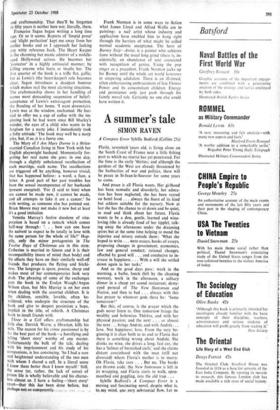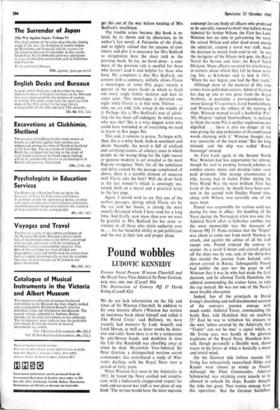A summer's tale
SIMON RAVEN
A Compass Error Sybille Bedford (Collins 25s) F1aAa, seventeen' years old, is living alone on the 'South CoaSt of France near a little fishing port to whiCh no tourist has yet penetrated. For the time is the early 'thirties; and although the gardens of the West are already threatened by the barbarities of war and politics, there will be peace in St-Jean-le-Sauveur for some years to come.
And peace is all Flavia wants. Her girlhood has been nomadic and disorderly, her educa- tion has been neglected, she has been reared on hotel food . . . always the finest of its kind but seldom suitable for the nursery. Now at last she has the chance to sit doWn and be quiet, to read and think about her future. Flavia wants to be a don, gentle, learned and wine- loving (she is already fond of her tipple), talk- ing away the afternoons under the dreaming spires but at the same time helping to mend the injustice and misery outside them : 'What she hoped to write ... were essays, books of essays, proposing changes in government, economics, law and general conduct; rational changes,
effected by good will . and conducive to in- crease in happiness . . . With a will she settled down again to her tasks.'
And so the good days pass: work in the morning, a bathe, lunch (left by the cleaning woman), work in the afternoon, a solitary
dinner in a cheap yet sound restaurant, dewy- eyed perusal of The New Statesman and
Nation, and then to bed . . . always with this last prayer to whatever gods there be: 'Same tomorrow!'
But this, of course, is the prayer which the gods never listen to. One tomorrow brings the wealthy and bohemian Therese, and with her physical passion; and the next . . . or almost the next ... brings Andree, and with Andree love. Not happiness; love. From the very be- ginning it is clear both to us and to Flavia that there is something wrong about Andree. She drinks no wine, she drives a long, fast car, she has a 'helmet of burnished curls,' and she claims distant cousinhood with the man (still not divorced) whom Flavia's mother is to marry. Oh Flavia, take care . . . But no. The books are thrown aside, the New Statesman is left in its wrapping, and Flavia starts to walk, open- mouthed and goggling, into the old trap .
Sybille Bedford's A Compass Error is a moving and fascinating novel, despite what is, tq.my mind, qne jtery. substantial flaw. Let us get this out of the way before treating of Mrs Bedford's excellence. . .
The trouble arises because this book is re- lated, by its theme and its characters, •to its author's last novel, A Favourite of the Gods, and so tightly related that for reasons of con- tinuity and plot it is necessary for Mrs Bedford to recapitulate here the story told in the previous book. So far, no harm done: a sum- mary of the previous tale is needful for those who haven't read it and helpful• for those who have. My complaint is that Mrs Bedford.. not content with a summary, wilfully. allows Flavia a monologue of some fifty pages (nearly a quarter of the entire book) in which to fetch out every single family skeleton and dust its every joint. This monologue is delivered one night while Flavia is in bed with Thirese . . . who, we are told, falls asleep in the middle of it. Perhaps this is Mrs Bedford's way of admit- ting she has been self-indulgent. In which case, why was she? She is a very elegant artist.who could have reminded us of everything we need to know in five pages flat.
This said, it remains to praise. To begin with, then, this is a witty book, both, n sentiment and idiom. Secondly, the novel is full of civilised and satisfying ironies, of salutary cases in which people do the wrong thing for the right reason or genuine modesty is yet revealed as the most flagrant arrogance. Next, for all the unbalance and delay caused by the passage complained of above, there is a notable element of suspense (will Flavia take the bait? Will she draw back at the last minute?) which is cunningly sus- tained, both on a moral and a practical level, to the last page.
Again, I should wish to say that one of the earliest passages, during which Flavia sits by the sea with her books, is among the most sweetly flavoured which I have read for a long time. And finally, now more than ever we must be grateful to Mrs Bedford for her stout re- sistance to all those who claim authority over us ... for her beautiful ability to put politicians and the rest in their low and proper place.















































 Previous page
Previous page